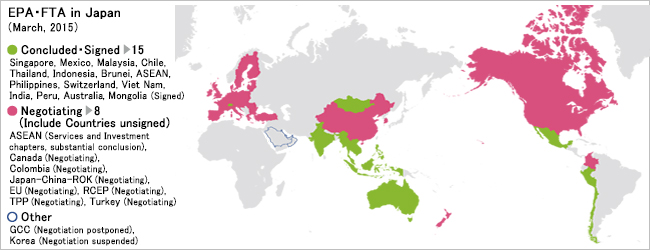Trans-Pacific Partnership Agreement
Country focus: Japan
Japan is an archipelago of more than 6,000 islands located in Northeastern Asia, nestled between the North Pacific Ocean and the Sea of Japan. With an estimated population of 127 million, more than 99 percent of the population speaks Japanese as their first language.
The nation has a fascinatingly rich, multifaceted culture that is both infused in deep traditions and apt at shifting and evolving. As such, when doing business in Japan you should be familiar with some of its cultural norms. Following are some tips and insights to help you understand and participate in some of these customs.
- Don’t be offended by the many questions a Japanese person may ask, and be prepared to answer questions regarding your title, your responsibilities, the number of employees that report to you, and so on. There are many forms to address a foreigner and the Japanese may ask many questions in order to determine the most appropriate form of address.
- While the Japanese recognize that shaking hands is a western greeting, the Japanese traditional greeting is to bow. If you are greeted with a bow you should observe carefully and not bow lower but bow to the same depth as the person greeting you. Your hands should be flat and placed against your thighs with your eyes looking down.
- Business cards are usually presented after the bow, and are also important to the Japanese. When doing business in Japan, it is important to have a business card that is up to date with all your credentials. It is also recommended to have the card printed in Japanese on the reverse side. Cards should be handled with care, never put a card in your back pocket or write information on the card itself.
- While some companies have moved to a five-day work week, a typical work week in Japan is 48 hours and five-and-a-half days (includes Saturday morning). Office hours are usually 9 a.m. to 5 p.m. Few managers take work home with them and instead prefer to go to dinner and return to the office until 9 or 10 p.m. Japan is 9 hours ahead of Greenwich Mean Time (GMT + 9 hours) or 14 hours ahead of Eastern Standard Time (EST +14 hours).
- Japan is a constitutional monarchy whereby the Emperor is the Chief of State with limited powers. The current emperor is Emperor Akihito who has been the emperor since 1989. Shinzō Abe is the Prime Minister and head of the government he was re-elected to the position in December 2012.
- Japan has the world’s third-largest economy with a GDP of $4.7 trillion and the world’s fourth-largest economy by purchasing power parity. It is also the world’s fifth-largest exporter and fifth-largest importer. International trade is very important to Japan. Its main exports are transportation equipment, motor vehicles, iron and steel products, semiconductors and auto parts. Its main imports are machinery and equipment, fossil fuels, foodstuffs (in particular beef), chemicals, textiles and raw materials for its industries.
Japan currently has 15 free trade agreements and economic partnership agreements in place and eight under negotiation. For more information about Japan’s foreign policy visit: http://www.mofa.go.jp/policy/economy/fta/index.html.
